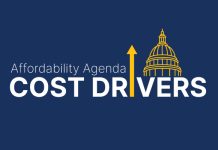In this episode of The Workplace podcast, CalChamber Executive Vice President and General Counsel Erika Frank, and CalChamber Policy Advocate Ashley Hoffman discuss three important employment-related bills that came out of the Legislature this year; two bills, AB 2257 and AB 1867, have been signed into law, and one bill, SB 1159, awaits action by Governor Gavin Newsom.
The Governor has until September 30 to either veto or sign SB 1159 into law. This article will be updated when the Governor takes action on the bill.
SB 1159
If enacted, SB 1159 (Hill; D-San Mateo) would take effect immediately.
The bill establishes a disputable presumption of workplace injury in workers’ compensation claims if a worker tests positive for COVID-19, Hoffman tells Frank. The bill can be thought of as containing three parts, she says:
- The first part of the bill codifies a former executive order signed by Governor Newsom that established a rebuttable presumption of workplace injury if an employee tested positive within 14 days of performing work, between March 19 and July 5.
- The second component establishes a disputable resumption that a first responder, fire fighter, medical provider, peace officer or in-home service provider who tests positive for COVID-19 on or after July 6 and within 14 days of performing work suffered a workplace injury covered by workers’ compensation.
- The third component establishes a disputable presumption for workers other than those identified in the second component who test positive on or after July 6. It establishes a presumption that there is a workplace injury if the worker tests positive for COVID-19 on or after July 6 within 14 days of performing work and there was an “outbreak” at the workplace, Hoffman adds.
What is defined as an “outbreak” will depend on the number of employees an employer has, she explains. If an employer has fewer than 100 workers and four people test positive, then the event is considered an “outbreak.” If an employer has more than 100 workers and at least 4% of employees test positive then the event is considered an “outbreak.”
The bill also specifies that a residence does not constitute a “workplace,” and therefore if an employee has been working from home since the pandemic started and tests positive for COVID-19, then there is no presumption of workplace injury. This does not apply, however, to service providers who provide medical services to patients inside their own home, she says.
Hoffman points out that SB 1159 shortens the window of time that employers have to respond to COVID-19-related workers’ compensation claims. Typically, employers have 90 days to respond to workers’ compensation claims, but they will now be limited to 30 or 45 days, depending on the claim.
If signed, SB 1159 would sunset in 2023, but the law may be extended depending on the COVID-19 crisis.
The bill is very important for employers to be aware of, Frank tells listeners, and she recommends that employers start talking to their workers’ compensation carriers to ensure they have all the information they need.
AB 2257
AB 2257 (Gonzalez; D-San Diego) was approved by the Governor on September 4 and took effect immediately.
The legislation deals with AB 5 (Gonzalez; D-San Diego), which was passed in 2019 and changed how employees and independent contractors are classified. AB 2257, Hoffman says, attempts to clarify and adds more exemptions to AB 5.
The bill clarifies terms in the business-to-business contracts exemptions, and clarifies what qualifies as an exemption for referral services (such as tutors, graphic designers, and others), she explains. The bill also adds exemptions affecting the music recording industry, data aggregators, freelance writers and photographers, among others.
It’s a “pretty lengthy bill with a lot of exemptions,” Hoffman tells Frank.
If someone thinks they fall under an exemption, Hoffman highly recommends they read the bill carefully in its entirety as sometimes an exemption applies only in very limited circumstances.
AB 1867
AB 1867 (Committee on Budget) was signed into law on September 9 and took effect immediately.
AB 1867 is a budget trailer bill, meaning that it’s a bill that came out of the Budget Committee, Hoffman explains.
The bill contains three components: a mediation pilot program, supplemental paid leave, and handwashing requirements for food sector workers.
The bill establishes a mediation pilot program with the Department of Fair Employment and Housing (DFEH) in response to SB 1383 (Jackson; D-Santa Barbara), which if signed will expand the California Family Rights Act to include small employers with 5 or more employees, Hoffman says. Under the bill, if an employer has fewer than 20 employees, then people with family medical leave claims filed under the California Fair Employment and Housing Act can mandate that the parties undergo mediation services with the DFEH.
The bill also establishes supplemental paid leave related to COVID-19 for those in the food service sector. In addition to providing sick leave, an employer is required to provide an additional 80 hours of leave for COVID-19-related reasons. The leave expires on December 31, 2020, but it may be extended if the federal Families First Coronavirus Response Act is extended.
AB 1867 also requires that food sector employees be allowed to wash their hands every 30 minutes, Hoffman explains. This time is in addition to employees’ meal and rest break periods.
Lastly, the bill also provides supplemental paid sick leave to emergency responders, and certain health care providers who work for employers with more than 500 employees, Hoffman tells Frank.
Employers are required to provide this additional leave within 10 days of the bill’s enactment (September 9), and employers will need to update their wage statements as well.
Hoffman adds that liability for failing to update wage statements won’t be enforceable until after the first pay period after enactment.

